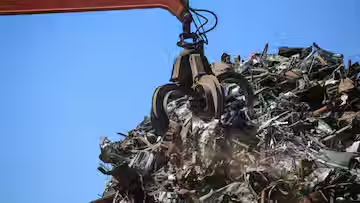Scrap Import Offers in India Dip Amid Global Shifts and Surging Local Supply: What’s Next for the Industry?
- Daivik Gupta
- Apr 17, 2025
- 3 min read
In recent weeks, the Indian scrap import market has experienced a notable shift, with offers slipping in response to global cues and a decline in bids. This trend is largely attributed to the ample local supply available in the country, which has created a unique set of challenges and opportunities for stakeholders in the industry.
Understanding the Market Dynamics
India has long been one of the largest importers of scrap metal, driven by its burgeoning manufacturing sector and the need for raw materials in various industries, including construction, automotive, and electronics. However, the recent downturn in scrap offers can be traced back to several global factors that have influenced pricing and demand.

Global Cues Impacting Scrap Prices
The international scrap market has been experiencing fluctuations due to a combination of geopolitical tensions, changes in trade policies, and economic slowdowns in key markets. As countries grapple with inflation and supply chain disruptions, the demand for scrap has been inconsistent. This has led to a decrease in offers from global suppliers, making it less attractive for Indian importers to engage in high-priced contracts.
Local Supply: A Double-Edged Sword
One of the most significant factors contributing to the decline in bids for scrap imports is the ample local supply available in India. The country has seen a surge in domestic scrap generation, driven by increased recycling efforts and a growing awareness of sustainability. As local suppliers ramp up their production, the competition for bids intensifies, leading to lower prices for imported scrap.
While this local supply is beneficial for manufacturers looking to source materials at competitive rates, it also poses challenges for importers who may find themselves with excess inventory. The balance between local and imported scrap is crucial, as too much reliance on domestic sources could lead to a stagnation in the import market.
The Future of Scrap Imports in India
As we look ahead, the Indian scrap import market is likely to continue navigating these complex dynamics. Importers will need to adapt to the changing landscape by exploring new sourcing strategies, diversifying their supply chains, and staying attuned to global market trends.
Moreover, the Indian government’s push for a circular economy and increased recycling initiatives may further bolster local supply, potentially reducing the country’s dependence on imported scrap in the long run. This shift could lead to a more sustainable and resilient scrap market, benefiting both the environment and the economy.
Conclusion
The recent slip in scrap offers in India, driven by global cues and ample local supply, highlights the intricate interplay between domestic and international markets. As stakeholders in the industry adjust to these changes, it will be essential to remain agile and informed. By embracing innovation and sustainability, India can position itself as a leader in the global scrap market, paving the way for a more sustainable future.
In this evolving landscape, staying ahead of the curve will be key for importers, manufacturers, and policymakers alike. The journey may be challenging, but the potential rewards are significant for those willing to adapt and innovate.
RN Gupta and Bros, a trusted name in the steel industry, has been a cornerstone of Mandi Gobindgarh, Punjab, since 1972. For over five decades, we have proudly contributed to India’s steel story, delivering excellence and reliability to our valued customers across the nation. Whether you’re looking for high-quality steel products or expert guidance, we are here to meet all your steel requirements. We supply you with steel round bars, flat bars, ms pipes, ms angles and ms channels in various grades and sizes. Contact us today and experience the difference of working with a legacy built on trust and innovation.
.png)



Comments